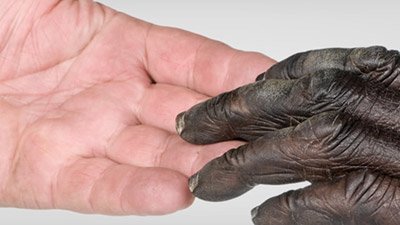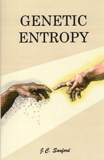Genetic Connections with Chimpanzees
Evolutionists often emphasize our genetic similarity to chimpanzees, but our genetic connections don’t end there.
News Source
- ScienceDaily: “Plant Clock Gene Also Works in Human Cells”
The correspondence of human and chimp genes is often used as evidence that we share a common ancestor. Creationists point out, however, that such similarities also make sense in light of a common designer.
The circadian clocks found across so many forms of life are often put together quite differently, despite how similar their ultimate function is.
New research reminds us that many of our genes resemble not only those found in primates, but also those identified in many other animals and even plants. Plant biologists at the University of California–Davis have uncovered another genetic connection in the DNA of the Arabidopsis plant. The gene helps regulate the plant’s circadian clock, an internal, biologically driven clock that is found in many plants, animals, and fungi. For example, in humans, the circadian clock helps determine our bodies’ natural sleep cycles.
The circadian clocks found across so many forms of life are often put together quite differently, despite how similar their ultimate function is. Nonetheless, the researchers identified a single gene in Arabidopsis that seems to work exactly like an equivalent gene in humans. Even more interesting, the plant and human genes were shown to function so similarly as to stand in for one another. The scientists had cultured human cells with a deficient copy of the gene. When it was replaced with the Arabidopsis gene, the human cells worked correctly. Likewise, working copies of the human version of the gene successfully corrected Arabidopsis cells with broken copies of the gene.
Such perfect similarity between a human gene and an equivalent plant gene—to the point where they can be swapped in and out successfully—might seem like solid evidence for evolution. But there’s a big problem: whereas evolutionists think chimpanzees and humans share a (relatively) recent common ancestor, animals and plants supposedly diverged long ago, and the rest of their respective circadian clocks work very differently. The team therefore explains the gene similarity as a case of “convergent evolution.” That term is invoked when similar biological functions, organs, or genes are found in two organisms whose most recent common ancestor “shouldn’t” have had the shared feature—and, thus, shared ancestry can’t explain the commonality.
The big problem with convergent evolution is that as we discover more and more alleged examples, many of which are highly complex, a puzzle arises: if it takes millions of years of chance and natural selection for such genetically complicated features to evolve even just once, how likely is it that they evolved more than once? For that reason, common design is shown to be a superior explanation: God re-used certain genetic or other biological features when it was appropriate, without regard for whether it might occasionally look like common ancestry or not.
For more information:
- Evolution Exposed, The Origin of Plants
- Get Answers: Genetics
- Get Answers: Evolution
- Get Answers: Design Features
For More Information: Get Answers
Remember, if you see a news story that might merit some attention, let us know about it! (Note: if the story originates from the Associated Press, FOX News, MSNBC, the New York Times, or another major national media outlet, we will most likely have already heard about it.) And thanks to all of our readers who have submitted great news tips to us. If you didn’t catch all the latest News to Know, why not take a look to see what you’ve missed?
(Please note that links will take you directly to the source. Answers in Genesis is not responsible for content on the websites to which we refer. For more information, please see our Privacy Policy.)
Recommended Resources

Answers in Genesis is an apologetics ministry, dedicated to helping Christians defend their faith and proclaim the good news of Jesus Christ.
- Customer Service 800.778.3390
- © 2024 Answers in Genesis





